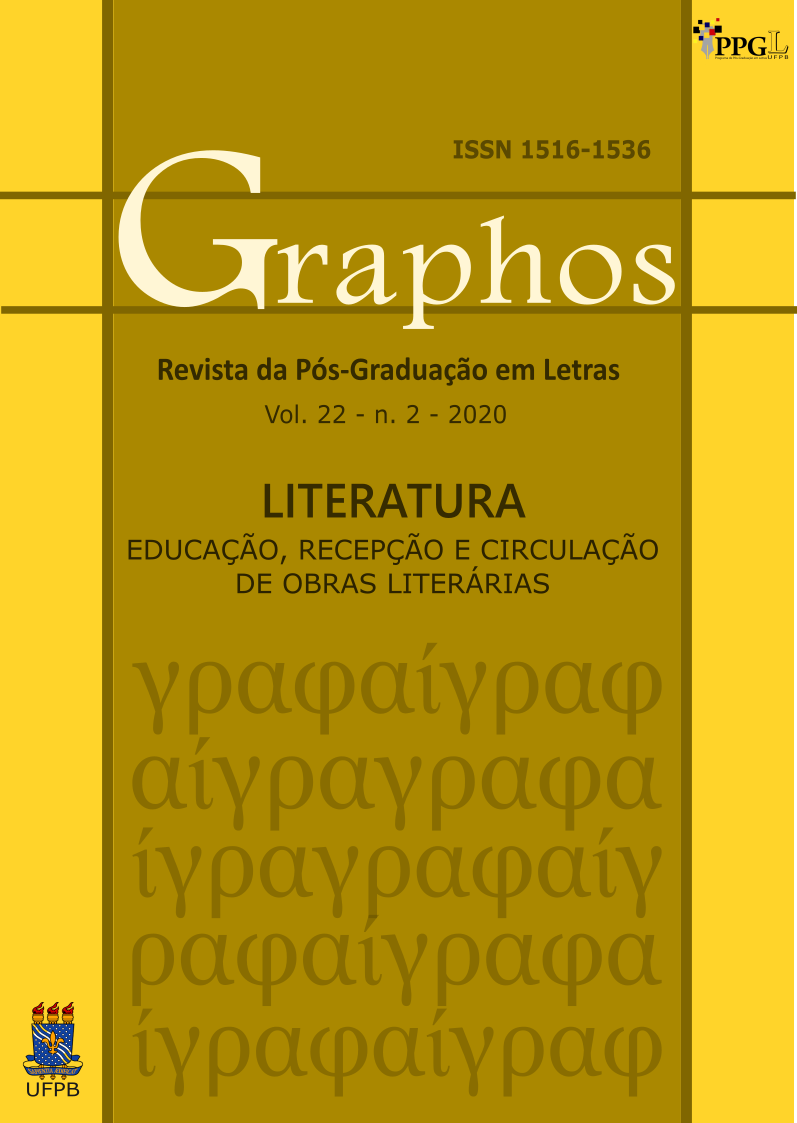Is it forbidden to prohibit? Vetos to literature in conservative times
DOI:
https://doi.org/10.22478/ufpb.1516-1536.2020v22n2.52869Keywords:
Literary representation, Censorship, Right to literatureAbstract
This paper aims to think about advances and challenges of literary studies at a time when the broad development of the means of production and circulation indicates a long life for literature, but the formative spaces of the reader are restricted by external forces from specialized contexts. How to guarantee the right to read literary texts without social inequalities and without underestimating the reader's ability to build their readings? How to react to a systemic movement of censorship of literary books? How to build a consistent argument in times when the vogue is praise for ignorance? Based on a journey from the concept of representation and its place in human experience, this text analyzes the relationship between literature and reality in its path of resistance to the system of linguistic signs, the social dimension and human limitation in all areas and forms. The prohibition or motion to repudiate certain literary works by public and private institutions constitutes the corpus for the analysis of the censorship modalities that are present in the contemporary world.
Downloads
References
BÁEZ, Fernando. História universal da destruição dos livros. Rio de Janeiro: Ediouro, 2006.
CANDIDO, Antonio. O direito à literatura. In: CANDIDO, Antonio. Vários escritos. Rio de Janeiro: Ouro sobre Azul, 2011.
CANDIDO, Antonio. Literatura e sociedade. São Paulo: T.A. Queirós, 2000.
CANDIDO, Antonio. A literatura e a formação do homem. In: CANDIDO, Antonio. Textos de intervenção. São Paulo: Duas Cidades; Editora 34, 2002.
CARPEAUX, Otto Maria. História da literatura ocidental. São Paulo: Leya, 2011.
CASTELLI, Vinícius. Escritor acusa Sesi de proibir leitura de livro sobre suicídio. Diário do grande ABC, 19 set. 2019. Disponível em: <https://www.dgabc.com.br/Mobile/Noticia/3131840/censura-na-sala-de-aula.>. Acesso em: 22 abr. 2020.
CNJ Serviço – Saiba como funciona a remição de pena. Agência CNJ de Notícias, 26 fev. 2016. Disponível em: <https://www.cnj.jus.br/cnj-servico-como-funciona-a-remicao-de-pena/>. Acesso em: 30 set. 2020.
COMPAGNON, Antoine. O demônio da teoria. Belo Horizonte: Editora UFMG, 2001.
DALCASTAGNÈ, Regina. Nas tripas do cão: a escrita como espaço de resistência. Estudos de Literatura Brasileira Contemporânea, Brasília, v. 29, p. 55-66, jan./jul. 2007. Disponível em: <http://seer.bce.unb.br/index.php/estudos/issue/view/264>. Acesso em: 07 abr. 2011.
DRUMMOND DE ANDRADE, Carlos. Procura da poesia. In: DRUMMOND DE ANDRADE, Carlos. Poesia Completa & Prosa. Rio de Janeiro: Nova Aguillar, 1977.
ESPINOZA, Marcelo. Livro de poesias é alvo de moção de repúdio e gera polêmica em plenário. Agência AL, 17 set. 2019. Disponível em: <http://agenciaal.alesc.sc.gov.br/index.php/noticia_single/livro-de-poesias-e-alvo-de-mocaeo-de-repudio-e-gera-polemica-em-plenario>. Acesso em: 25 abr. 2020.
FOUCAULT, Michel. A ordem do discurso. São Paulo: Edições Loyola, 1996.
GEISLER, Luisa. Banida de feira literária no RS, autora lamenta censura por linguajar inadequado. O Globo, 13 nov. 2019. Disponível em:
<https://oglobo.globo.com/cultura/banida-de-feira-literaria-no-rs-autora-lamenta-censura-por-linguajar-inadequado-24079033>. Acesso em: 20 abr. 2020.
HATOUM, Milton. Entrevista. In: GONÇALVES, José Eduardo. Ofício da palavra. Belo Horizonte: Autêntica, 2014.
ISER, Wolfgang. Os atos de fingir ou o que é fictício no texto ficcional. In: ISER, Wolfgang. Teoria da literatura em suas fontes. Rio de Janeiro: Civilização Brasileira, 2002.
JOLLES, André. Formas simples. São Paulo: Cultrix, 1976.
LARROSA, Jorge. Invitaciones entre Pedagogía y Literatura. In: LARROSA, Jorge; SKLIAR, Carlos (org.). Entre Pedagogía y Literatura. Buenos Aires: Mino e Dávila, 2013.
LISPECTOR, Clarice. Menino a bico de pena. In: LISPECTOR, Clarice. Felicidade Clandestina. Rio de Janeiro: Francisco Alves Editora, 1971.
MONTES, Graciela. Buscar indícios construir sentidos. Bogotá: Babel Livros, 2017.
OLIVEIRA, Regiane. Censura de livros expõe “laboratório do conservadorismo” em Rondônia. El País, 08 fev. 2020. Disponível em: <https://brasil.elpais.com/brasil/2020-02-08/censura-de-livros-expoe-laboratorio-do-conservadorismo-em-rondonia.html>. Acesso em: 30 abr. 2020.
REZENDE, Lucas. Ninguém quer saber de jovem com senso crítico, diz Bolsonaro em Vitória. Folha de São Paulo, 31 jul. 2018. Disponível em: <https://www1.folha.uol.com.br/poder/2018/07/ninguem-quer-saber-de-jovem-com-senso-critico-diz-bolsonaro-em-vitoria.shtml>. Acesso em: 24 abr. 2020.
RUFFATO, Luiz. Entrevista. In: GONÇALVES, José Eduardo. Ofício da palavra. Belo Horizonte: Autêntica, 2014.
STEINER, George. Aqueles que queimam livros. Belo Horizonte: Âyiné, 2018.
TIBURI, Marcia. Um útero é do tamanho de um punho de Angélica Freitas. Cult, 12 maio 2013. Disponível em: <https://revistacult.uol.com.br/home/um-utero-e-do-tamanho-de-um-punho-de-angelica-freitas/>. Acesso em: 28 abr. 2020.
Downloads
Published
Issue
Section
License
Copyright (c) 2020 Revista Graphos

This work is licensed under a Creative Commons Attribution 4.0 International License.







